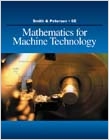Description: The new edition of this best-selling text has been reviewed and revised to clarify and update an understanding of mathematical concepts necessary for success in the machine trades and manufacturing fields. Mathematics for Machine Technology, Sixth Edition overcomes the often mechanical "plug in" approach found in many trade-related texts. A complete grasp of mathematical concepts are emphasized in the presentation and application of a wide-range of topics from general arithmetic processes to oblique trigonometry, compound angles, and numerical control. The material covered by this text is accompanied by realistic industry-related examples, illustrations, and actual applications, which progress from the simple to the relatively complex. Mathematics for Machine Technology, Sixth Edition provides readers with practical vocational and technical applications of mathematical concepts necessary to excel in the machine, tool-and-die, and tool design industry. Product Benefits: - New units added on polar coordinates and hexadecimal and BCD (Binary Coded Decimal) numeration systems as well as new material conversion between the metric and the customary systems of measure make this more comprehensive as well as up-to-date
- Scientific calculator examples are updated and expanded and sequencing has been modernized, with up-to-date instructions on how to use this tool
- Problems and examples reinforce the book's method of progressing from the simple to the relatively complex, underscoring its organized approach to learning.
- Extensive use of realistic trade-related illustrations bring concepts to life
- Emphasizes an analytical approach that is necessary in translating engineering drawing dimensions to machine-working dimensions giving readers a realistic experience for what's required in the industry
- An all-new Instructor's e-resource has been developed for this edition, containing answers and solutions to all problems
Table of Contents: Section I: COMMON FRACTIONS AND DECIMAL FRACTIONS
Unit 1 Introduction to Common Fractions and Mixed Numbers
Unit 2 Addition of Common Fractions and Mixed Numbers
Unit 3 Subtraction of Common Fractions and Mixed Numbers
Unit 4 Multiplication of Common Fractions and Mixed Numbers
Unit 5 Division of Common Fractions and Mixed Numbers
Unit 6 Combined Operations of Common Fractions and Mixed Numbers
Unit 7 Computing with a Calculator: Fractions and Mixed Numbers
Unit 8 Introduction to Decimal Fractions
Unit 9 Rounding Decimal Fractions and Equivalent Decimal and Common Fractions
Unit 10 Addition and Subtraction of Decimal Fractions
Unit 11 Multiplication of Decimal Fractions
Unit 12 Division of Decimal Fractions
Unit 13 Powers
Unit 14 Roots
Unit 15 Table of Decimal Equivalents and Combined Operations of Decimal Fractions
Unit 16 Computing with a Calculator: Decimals
Unit 17 Achievement Review- Section I
Section II: RATIO, PROPORTION, AND PERCENT
Unit 18 Ratio and Proportion
Unit 19 Introduction to Percents
Unit 20 Basic Calculations of Percentages, Percents, and Rates
Unit 21 Percent Practical Applications
Unit 22 Direct and Inverse Proportions
Unit 23 Achievement Review- Section II
Section III: LINEAR MEASUREMENT: ENGLISH AND METRIC
Unit 24 Customary (English) Units of Measure
Unit 25 Metric Units of Measure
Unit 26 Degree of Precision and Greatest Possible Error, Absolute Error, and Relative Error
Unit 27 Tolerance, Clearance, and Interference
Unit 28 Customary and Metric Steel Rules
Unit 29 Customary Vernier Calipers and Height Gages
Unit 30 Customary Micrometers
Unit 31 Customary and Metric Gage Blocks
Unit 32 Achievement Review- Section III
Section IV: FUNDAMENTALS OF ALGEBRA
Unit 33 Symbolism and Algebraic Expressions
Unit 34 Signed Numbers
Unit 35 Algebraic Operations of Addition, Subtraction, and Multiplication
Unit 36 Algebraic Operations of Division, Powers, and Roots
Unit 37 Introduction to Equations
Unit 38 Solution of Equations by the Subtraction, Addition, and Division Principles of Equality
Unit 39 Solution of Equations by the Multiplication, Root and Power Principles of Equality
Unit 40 Solution of Equations Consisting of Combined Operations and Rearrangement of Formulas
Unit 41 Applications of Formulas to Cutting Speed, Revolutions Per Minute, and Cutting Time
Unit 42 Applications of Formulas to Spur Gears
Unit 43 Achievement Review- Section IV
Section V: FUNDAMENTALS OF PLANE GEOMETRY
Unit 44 Lines and Angular Measure
Unit 45 Protractors- Simple, Semicircular, and Vernier
Unit 46 Types of Angles and Angular Geometric Principles
Unit 47 Introduction to Triangles
Unit 48 Geometric Principles for Triangles and Other Common Polygons
Unit 49 Introduction to Circles |

